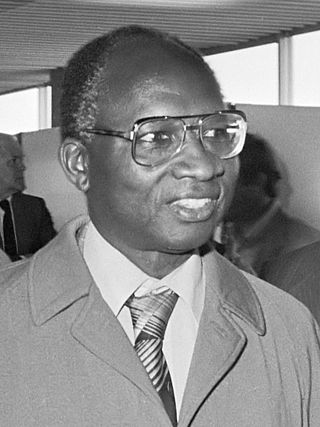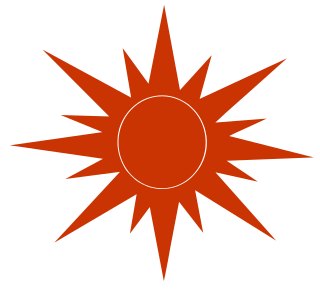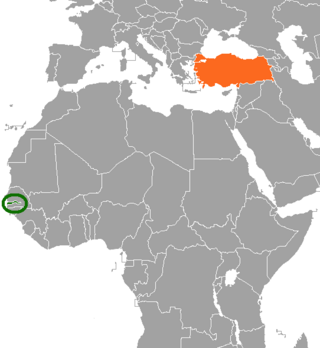
The Gambia, officially the Republic of The Gambia, is a country in West Africa. Geographically, The Gambia is the smallest country in continental Africa; it is surrounded by Senegal on all sides except for the western part, which is bordered by the Atlantic Ocean.

Politics of The Gambia takes place within the framework of a presidential republic, whereby the President of The Gambia is both head of state and head of government, and of a multi-party system. Executive power is exercised by the government. Legislative power is vested in both the government and parliaments.

Sir Dawda Kairaba Jawara was a Gambian politician who served as prime minister from 1962 to 1970, and then as the first President of The Gambia from 1970 to 1994, when he was deposed.
Sir Farimang Mamadi Singhateh, GCMG was the second and last Governor-General of the Gambia, representing Queen Elizabeth II as head of state. Succeeding Sir John Warburton Paul, who had previously been the last Governor of The Gambia before independence, Sir Farimang was the only Gambian citizen to hold that post, beginning in 1966. His wife Fanta Singhateh was the first Gambian woman to be First Lady. When the country became a republic in 1970, the office was abolished, and the Prime Minister, Dauda Kairaba Jawara became an executive President.

The People's Democratic Organisation for Independence and Socialism (PDOIS) is a socialist political party in the Gambia. Since 2005, it has been part of the National Alliance for Democracy and Development (NADD). It was part of Coalition 2016 in the 2016 presidential election, whose candidate, Adama Barrow, defeated long-time incumbent Yahya Jammeh. The PDOIS also publishes a party newspaper, Foroyaa, which was noted for its opposition to the Jammeh regime.
The National Convention Party (NCP) is a centre-left political party in Gambia. It was the main opposition party between 1975 and 1994. It was originally founded on 7 September 1975 when it first launched at Busumbala by former vice-president Sheriff Mustapha Dibba two weeks after his expulsion from the People's Progressive Party (PPP). It initially welcomed the 1994 coup but was banned from participating in elections in August 1994. Prior to the 1992 elections, the party faced a series of setbacks as many of its leaders rejoin the PPP. Its candidate at the presidential elections of 18 October 2001, Sheriff Dibba, came fourth with 3.77% of the popular vote. At the last legislative elections, held on 17 January 2002, the party won no seats. When the party was formed, the then president of the country Dawda Jawara predicted that it would not last more than three months. The NCP was part of the Coalition 2016 for the 2016 presidential election, where Adama Barrow was declared the opposition's candidate and subsequently won.

The People's Progressive Party is a political party in the Gambia. It was the dominant ruling party of the House of Representatives and the presidency from 1962 to 1994. The president throughout this time period was Dawda Jawara.

The National Assembly of the Gambia is the unicameral legislature of the Gambia. The authorisation for the National Assembly lies in Chapter VII of the Constitution of the Gambia. It is composed of 53 members directly elected through first past the post, and a further five members appointed by the President.
Sheriff Mustapha Dibba was a Gambian politician who was the 1st Vice-President of the Gambia (1970–1972) and also served as the country's National Assembly speaker from 2002 to 2006. He was also leader of the National Convention Party (NCP).

Pierre Sarr N'Jie was a Gambian lawyer and politician who served as the Chief Minister of the Gambia from 1961 to 1962. He was the country's first head of government following the declaration of self-rule in 1961. From 1952 until 1977, he was leader of the United Party. He was also a member of the House of Representatives from 1960 to 1972, and de facto Leader of the Opposition for a period, opposite Dawda Jawara.
Assan Musa Camara was a Gambian politician. He served as Vice President of Dawda Jawara, almost continuously from 1972 to 1977, and then again from 1981 to 1982, and the Member of Parliament (MP) for Kantora from 1960 to 1987.

General elections were held in the Gambia on 11 March 1987. The election date had been announced on 1 January 1987 and nominations for presidential candidates closed on 9 February.

Alieu Ebrima Cham Joof commonly known as Cham Joof or Alhaji Cham Joof, was a Gambian historian, politician, author, trade unionist, broadcaster, radio programme director, scout master, Pan-Africanist, lecturer, columnist, activist and an African nationalist who advocated for the Gambia's independence during the colonial era.

In the 1994 Gambian coup d'état, a group of soldiers led by 29-year-old Lieutenant Yahya Jammeh seized power in a bloodless coup d'état on the morning of 22 July, ousting Dawda Jawara, who had been President of The Gambia since it became a Republic in 1970.
Hannah Augusta Darling Jawara, was a Gambian nurse, playwright and activist for women's rights. She was the first wife of Sir Dawda Jawara, Prime Minister of the Gambia.
Aja Nyimasata Sanneh-Bojang was a Gambian politician. She was the first woman to be elected to the Gambian National Assembly, when she won the seat of Northern Kombo for the People's Progressive Party. Although she kept the seat in 1987, she was deselected by her party and did not contest the 1992 election.
Alieu Badara Njie was a Gambian statesman who served as the 3rd Vice-President of the Gambia from 1977 to 1981. He served as the first Gambian Ambassador to Senegal and in Dawda Jawara's first cabinet. He held several ministerial roles under Jawara and played a key role in securing Gambian independence. He was Minister of Foreign Affairs from 1965–1967 and 1974–77, Minister of Communications from 1960–1961 and 1963–1965, Minister of Works from 1962–1965, Minister of Information from 1970–1971, and Minister of Agriculture from 1972–1974.
Trade unions in The Gambia are regulated under the Labour Act 2007. The first trade union was the Bathurst Trade Union (BTU), founded in 1929, which led a general strike that year. General strikes were also led by the Gambia Workers' Union (GWU) in 1960, 1961, 1967, and 1970, although not all were successful. There are three trade union centres in The Gambia: the Gambia Trade Union Bureau (GamTUB), the Gambian Workers' Confederation (GWC), and the Gambia National Trade Union Congress (GNTUC). The country joined the International Labour Organization (ILO) in 1995.

The Gambia–Turkey relations are the foreign relations between The Gambia and Turkey.
Ibrahima Muhammadu/Momodou Garba-Jahumpa was a Gambian trade union leader and politician who served as the Minister for Agriculture, Minister for Health and Minister for Finance.













